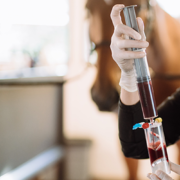What Do Electrolytes Actually Do?

Performance horses who are in strenuous work will generally sweat a lot on a regular basis. And they will sweat profusely in hotter and more humid weather.
So what does feeding electrolytes actually do for your horse?
Feeding electrolytes to horses helps replenish vital nutrients to the body that are lost in sweat. This is important for horses who are expected to perform on a regular basis, and just overall to keep them healthy.
The loss of electrolytes can lead to dehydration, lactic acid build-up in the muscles and even “tying up” syndrome.
The exercising horse produces a tremendous amount of heat in the muscles. This can raise the core body temperature in the horse from 39 degrees Celsius at rest to temperatures exceeding 42 C in a matter of minutes.
The horse copes with this increase in temperature by sweating large amounts of bodily fluids to keep cool. For example, Thoroughbreds racing over distances of one-to-two miles may lose up to 10 liters of fluids during the warm-up, race and initial recovery period. That substantial loss of fluid and electrolytes associated with sweating at this rate results in significant adverse effects on the horse’s ability to regulate internal temperature and puts stress on the heart.
Needless to say, working horses should have access to more than just a salt block in their stall to help them replenish their natural nutrients without risk of overheating or stress.
The most important ingredients in electrolytes are salt based. Potassium, sodium, calcium, bicarbonate, magnesium, chloride and vitamin E, aid in blood pressure regulation, neutralize body fluids like lactic acid, and provide antioxidants to the body. Electrolyte GOLD by TRM, offers all these ingredients and more, for support during exercise, heat and stress.
Horse owners should realize that electrolytes work immediately once digested, and cannot be “pre-loaded” into their system by feeding for days or weeks in advance. Electrolytes are only absorbed by the body when and if in need, such as in times of excess work, heat, or even stress.
The body will crave electrolytes when there has been a significant loss. Electrolytes are water soluble so any excess are generally eliminated.
Stress is an often overlooked factor where electrolytes can benefit. A stressed horse will often drink less and lose fluids in the process.



